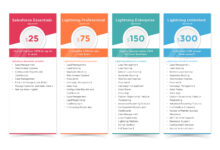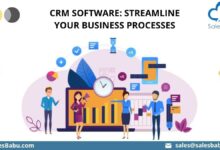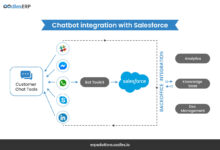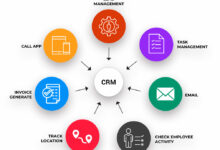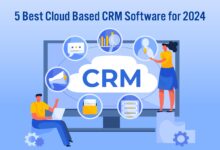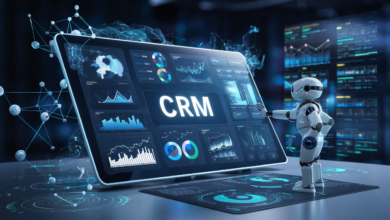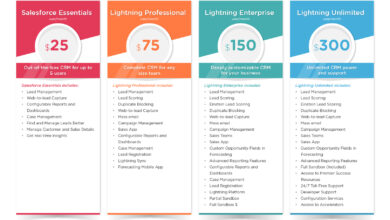CRM For Sales And Marketing Automation: Streamlining Customer Relationship Management
Starting with CRM for Sales and Marketing Automation, this article delves into the crucial role of CRM in enhancing sales and marketing efficiency, ultimately improving customer relationships.
Exploring key features, integration strategies, customization options, and future trends, this comprehensive guide provides valuable insights for businesses looking to optimize their CRM systems.
Introduction to CRM for Sales and Marketing Automation
CRM, or Customer Relationship Management, plays a crucial role in sales and marketing automation by providing a centralized platform for managing customer interactions, sales activities, and marketing campaigns. CRM systems help businesses streamline processes, improve communication, and enhance customer relationships, ultimately leading to increased efficiency and revenue.
Benefits of Using CRM for Sales and Marketing Teams
- Improved Lead Management: CRM systems enable sales teams to track and manage leads more effectively, ensuring timely follow-ups and personalized communication.
- Enhanced Customer Insights: By capturing and analyzing customer data, CRM systems provide valuable insights that help sales and marketing teams tailor their strategies to meet customer needs.
- Streamlined Communication: CRM systems centralize customer information, facilitating seamless communication between sales, marketing, and customer service teams.
- Increased Efficiency: Automation features in CRM systems automate repetitive tasks, saving time and allowing sales and marketing teams to focus on high-value activities.
How CRM Systems Improve Customer Relationships and Increase Efficiency
- Personalized Interactions: CRM systems enable businesses to deliver personalized experiences to customers by storing preferences, purchase history, and interactions for targeted marketing campaigns.
- Effective Customer Service: CRM systems help customer service teams access relevant customer information quickly, leading to faster issue resolution and improved customer satisfaction.
- Sales Pipeline Management: CRM systems provide visibility into the sales pipeline, allowing sales teams to track deals, forecast revenue, and prioritize opportunities for better conversion rates.
- Data Security and Compliance: CRM systems ensure data security and compliance with regulations by centralizing customer data and implementing access controls to protect sensitive information.
Key Features of CRM Software
CRM software offers a wide range of features that are essential for sales and marketing automation. These features help businesses streamline their processes, improve efficiency, and enhance customer relationships.
Lead Management
- Automated lead capture from various sources such as website forms, social media, and email campaigns.
- Lead scoring to prioritize leads based on their level of engagement and likelihood to convert.
- Lead nurturing through automated workflows and personalized communication to move leads through the sales funnel.
Customer Communication
- Centralized communication tracking to monitor interactions with leads and customers across multiple channels.
- Automated email campaigns for targeted messaging and follow-ups based on customer behavior.
- Integration with communication tools like phone systems and live chat for seamless customer interactions.
Sales Automation
- Automated task assignment and reminders for sales reps to follow up with leads at the right time.
- Sales pipeline management to track deals, forecast revenue, and identify bottlenecks in the sales process.
- Integration with sales tools like CRM reporting and analytics for performance tracking and optimization.
Marketing Automation
- Automated campaign management for targeted marketing efforts and personalized messaging.
- Lead tracking and attribution to measure the effectiveness of marketing campaigns and channels.
- Integration with marketing tools like social media platforms and advertising networks for seamless campaign execution.
Integrating CRM with Sales Strategies
Integrating Customer Relationship Management (CRM) software with sales strategies is crucial for enhancing the overall performance and efficiency of a sales team. By aligning CRM tools with sales goals, organizations can streamline their processes, gain valuable insights, and ultimately boost revenue generation.
Utilizing CRM Data for Improved Sales Performance
CRM data can be utilized in various ways to enhance sales performance and drive success. Here are some key practices:
- Segmentation: Use CRM data to segment customers based on their behavior, preferences, and buying patterns. This allows for targeted and personalized sales approaches.
- Lead Scoring: Implement lead scoring models within the CRM system to prioritize leads based on their likelihood to convert. This helps sales teams focus their efforts on high-potential prospects.
- Performance Tracking: Monitor sales performance metrics such as conversion rates, sales cycle length, and customer acquisition costs using CRM data. This enables continuous improvement and optimization of sales strategies.
Aligning CRM Systems with Sales Goals
Best practices for aligning CRM systems with sales goals include:
- Setting Clear Objectives: Define specific sales goals and objectives that align with the overall business strategy. Ensure that these goals are measurable and achievable.
- Training and Adoption: Provide comprehensive training to sales teams on how to effectively use the CRM system. Encourage adoption and utilization of CRM tools in daily sales activities.
- Customization and Integration: Customize the CRM system to align with the unique sales processes and workflows of the organization. Integrate CRM with other sales tools and platforms for seamless data flow and enhanced efficiency.
Role of CRM in Marketing Campaigns
CRM software plays a crucial role in enhancing marketing campaigns by providing valuable insights and tools to personalize interactions with customers. Through the use of CRM data, businesses can tailor their marketing efforts to target specific customer segments effectively.
Personalizing Marketing Efforts
Using CRM data, marketers can create personalized campaigns based on customer preferences, purchase history, and behavior patterns. By analyzing data such as customer demographics, past interactions, and engagement levels, businesses can send targeted messages that resonate with individual customers. For example, a clothing retailer can use CRM data to send personalized product recommendations to customers based on their previous purchases and browsing history.
Impact on Lead Generation and Customer Segmentation
CRM software helps businesses generate leads by tracking customer interactions, identifying potential prospects, and nurturing relationships. By analyzing CRM data, marketers can identify high-quality leads and prioritize follow-up efforts to increase conversion rates. Additionally, CRM tools enable businesses to segment customers based on various criteria such as demographics, buying behavior, and engagement levels. This segmentation allows marketers to tailor their campaigns to specific customer groups, leading to more effective marketing strategies.
Customization and Scalability of CRM Platforms
Customization and scalability are crucial aspects of CRM platforms for sales and marketing teams. Let’s delve into the options available and the importance of adapting to changing business needs.
Customization Options in CRM Platforms
- Custom Fields: CRM platforms allow users to create custom fields to capture specific data points relevant to their business.
- Workflow Automation: Users can customize workflows to automate repetitive tasks and streamline processes.
- Dashboard Customization: Sales and marketing teams can personalize dashboards to display key metrics and reports tailored to their needs.
- Integration Capabilities: CRM systems offer integration with other tools and software to enhance functionality and meet unique requirements.
Scalability of CRM Systems
- Flexible Architecture: CRM platforms are designed with a scalable architecture that can accommodate growing data volumes and user bases.
- Multi-Cloud Support: Some CRM systems offer multi-cloud support, allowing businesses to scale resources based on demand and expansion.
- Modular Design: CRM platforms with a modular design enable organizations to add or remove features as needed, ensuring scalability without unnecessary complexity.
- Enterprise-Grade Solutions: Large enterprises can opt for CRM solutions that are built to scale and support complex business operations across multiple departments and regions.
Choosing a CRM platform that offers robust customization options and scalability is essential for long-term success in sales and marketing operations.
Data Management and Analytics in CRM
Data management plays a crucial role in CRM for sales and marketing automation. It involves storing, organizing, and maintaining customer data to ensure its accuracy and accessibility. This data serves as the foundation for all sales and marketing activities within the CRM platform.
CRM analytics, on the other hand, help in tracking sales and marketing performance by analyzing the data collected in the CRM system. By utilizing various analytical tools and techniques, businesses can gain valuable insights into customer behavior, preferences, and trends. This information enables them to make data-driven decisions to improve their sales and marketing strategies.
Utilizing CRM Data for Informed Business Decisions
- Segmenting Customers: CRM data can be leveraged to segment customers based on various criteria such as demographics, purchase history, and engagement level. This segmentation allows businesses to personalize their marketing campaigns and tailor their sales approach to meet the specific needs of different customer groups.
- Forecasting Sales Trends: By analyzing historical sales data stored in the CRM system, businesses can identify patterns and trends to forecast future sales performance. This insight helps in setting realistic sales targets and developing effective strategies to achieve them.
- Improving Customer Retention: CRM data provides valuable information about customer interactions, feedback, and satisfaction levels. By analyzing this data, businesses can identify at-risk customers and implement retention strategies to prevent churn and foster long-term customer relationships.
- Measuring Marketing ROI: CRM analytics enable businesses to track the effectiveness of their marketing campaigns by analyzing key metrics such as conversion rates, lead generation, and customer acquisition costs. This data helps in optimizing marketing spend and maximizing ROI.
CRM Integration with Other Tools
CRM integration with other tools like email marketing platforms offers numerous benefits to businesses. By connecting CRM with email marketing platforms, companies can streamline their marketing efforts, personalize communication with customers, and track the effectiveness of their campaigns more efficiently.
Enhanced Cross-Functional Collaboration
Integrating CRM with other tools enhances cross-functional collaboration within an organization. It allows different departments such as sales, marketing, and customer service to access real-time customer data, enabling them to work together seamlessly to provide a better customer experience. This collaboration leads to improved customer satisfaction and loyalty.
Tips for Seamless Integration
To ensure a smooth integration of CRM with existing systems and tools, consider the following tips:
- Identify your integration goals and objectives clearly before starting the process.
- Choose tools and software that are compatible with your CRM system to avoid compatibility issues.
- Train your employees on how to use the integrated tools effectively to maximize the benefits of integration.
- Regularly monitor and evaluate the integration process to make necessary adjustments and improvements.
Mobile CRM Solutions
Mobile CRM solutions play a crucial role in enhancing the efficiency and effectiveness of sales and marketing teams by providing access to customer data on the go. This accessibility allows for real-time updates, improved communication, and seamless collaboration among team members.
Advantages of Mobile CRM Solutions
- Flexibility: Sales and marketing professionals can access CRM data anytime, anywhere, enabling them to respond promptly to customer inquiries and make informed decisions on the fly.
- Increased Productivity: With mobile CRM apps, teams can update information, track leads, and manage tasks efficiently even while on the move, leading to higher productivity levels.
- Improved Customer Relationships: The ability to access customer data on mobile devices allows for personalized interactions and more meaningful engagements, ultimately strengthening customer relationships.
Examples of Mobile CRM Apps Benefits
-
Field Sales: Sales representatives can update customer information, log interactions, and access sales data during client visits, enhancing the overall sales process.
-
Marketing Campaigns: Marketers can analyze campaign performance, track leads, and adjust strategies in real-time using mobile CRM apps, leading to more effective campaigns and higher ROI.
-
Customer Support: Support teams can address customer issues promptly, access case histories, and provide personalized solutions on the go, resulting in enhanced customer satisfaction.
Training and Adoption of CRM Systems
Training sales and marketing teams on CRM systems is crucial for successful implementation and utilization within an organization. Proper training ensures that teams understand how to effectively use the CRM tools, leading to increased productivity and improved customer relationships.
Importance of Training for Successful Adoption
- Training helps employees understand the features and functionalities of the CRM software, enabling them to utilize it to its full potential.
- It ensures consistency in data input and management, reducing errors and improving the overall quality of customer information.
- Proper training empowers employees to leverage the CRM system to streamline their workflows, track customer interactions, and drive sales and marketing efforts effectively.
Strategies for Successful Adoption
- Provide hands-on training sessions to allow employees to practice using the CRM software in real-life scenarios.
- Create training materials, guides, and resources that employees can refer to for ongoing support and learning.
- Offer continuous education and refresher courses to keep employees updated on new features and best practices.
Examples of Higher CRM Utilization and ROI through Proper Training
Company X saw a 20% increase in sales productivity and a 15% increase in revenue after implementing comprehensive CRM training for its sales and marketing teams.
By investing in tailored training programs, Company Y achieved a 25% improvement in customer retention rates and a 30% reduction in lead conversion time.
CRM Security and Compliance
Data security and compliance are crucial aspects of CRM systems, especially when dealing with sensitive customer information. Ensuring the protection of data not only builds trust with customers but also helps companies avoid hefty fines and reputational damage due to non-compliance with regulations like GDPR.
Importance of Data Security in CRM
Implementing robust security measures in CRM systems is essential to safeguard customer data from unauthorized access or breaches. By encrypting data, restricting access based on roles, and monitoring system activity, companies can create a secure environment for sensitive information.
Ensuring Compliance with Regulations
Compliance with regulations such as GDPR requires companies to obtain explicit consent for data processing, provide transparency about data usage, and enable customers to request access to or deletion of their data. By incorporating these practices into CRM platforms, organizations can maintain compliance and protect customer rights.
Best Practices for CRM Security
- Regularly update CRM software to patch vulnerabilities and enhance security features.
- Train employees on data security protocols and best practices to prevent human errors that could compromise data.
- Implement multi-factor authentication to add an extra layer of security for user access.
- Conduct regular security audits and risk assessments to identify and address potential security gaps.
- Partner with reputable CRM providers that prioritize data security and compliance in their solutions.
Future Trends in CRM for Sales and Marketing Automation
The future of CRM for sales and marketing automation is exciting, with emerging technologies set to transform the way businesses engage with their customers. One of the key trends shaping this evolution is the increasing integration of artificial intelligence (AI) and machine learning into CRM systems. These technologies have the potential to revolutionize how companies manage customer relationships, streamline processes, and drive sales and marketing efforts to new heights.
AI and Machine Learning Integration
AI and machine learning are revolutionizing CRM by enabling predictive analytics, personalized customer experiences, and automation of routine tasks. By analyzing large volumes of data, these technologies can uncover valuable insights, identify trends, and make intelligent recommendations to sales and marketing teams. This leads to more targeted campaigns, improved lead scoring, and enhanced customer segmentation, ultimately driving better sales outcomes.
Evolution of CRM Systems
Looking ahead, CRM systems are likely to evolve to meet the changing needs of sales and marketing teams. We can expect to see greater customization options, enhanced scalability, and more seamless integrations with other tools and platforms. The focus will be on creating a unified and holistic view of the customer journey, allowing businesses to deliver personalized and consistent experiences across all touchpoints.
Enhanced Customer Engagement
As CRM systems continue to advance, businesses will be able to engage with customers in more meaningful ways. By leveraging data insights and AI-driven recommendations, companies can anticipate customer needs, deliver proactive support, and build long-lasting relationships. This level of personalized engagement will be crucial in an increasingly competitive market where customer experience is a key differentiator.
Omni-channel Integration
Another trend we can expect to see in the future of CRM is the seamless integration of omni-channel communication. CRM systems will facilitate communication across multiple channels, including email, social media, SMS, and chat, ensuring a consistent and cohesive customer experience. This will enable businesses to engage with customers wherever they are, delivering the right message at the right time through their preferred channel.
Ending Remarks
In conclusion, CRM for Sales and Marketing Automation is a powerful tool that not only streamlines processes but also transforms how businesses interact with customers. Embracing the advancements in CRM technology is essential for staying competitive in today’s dynamic market landscape.
